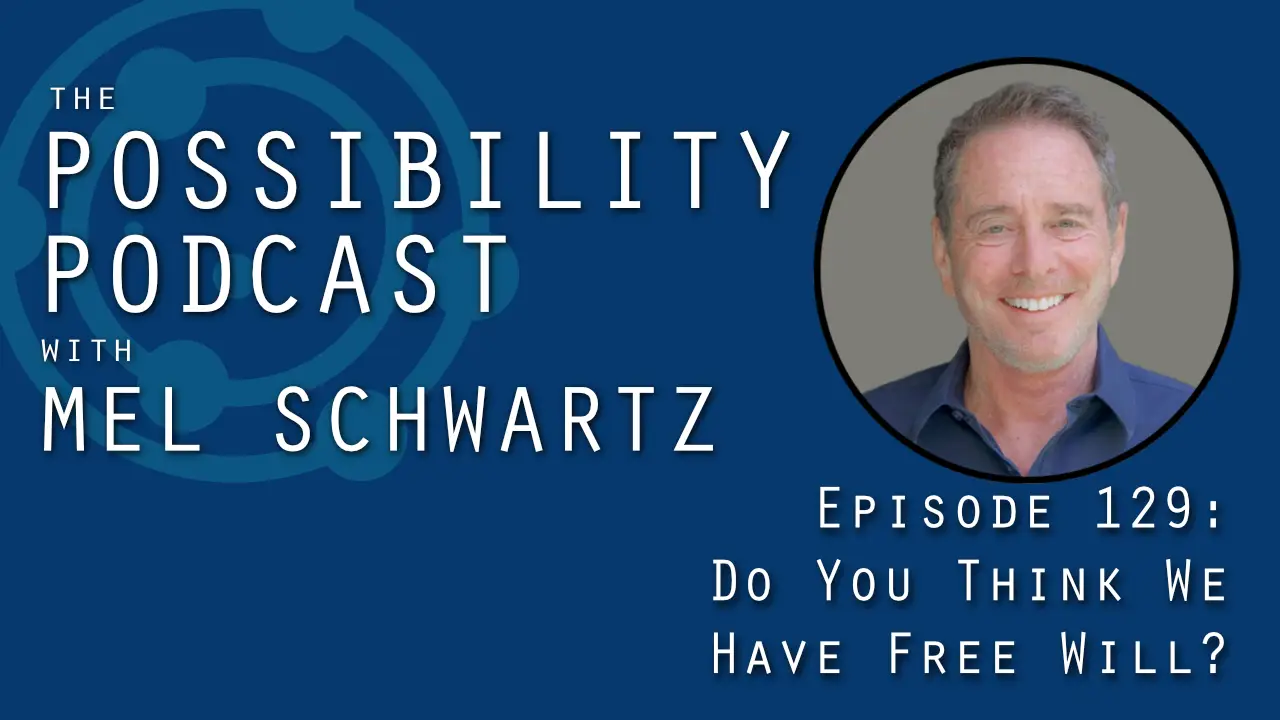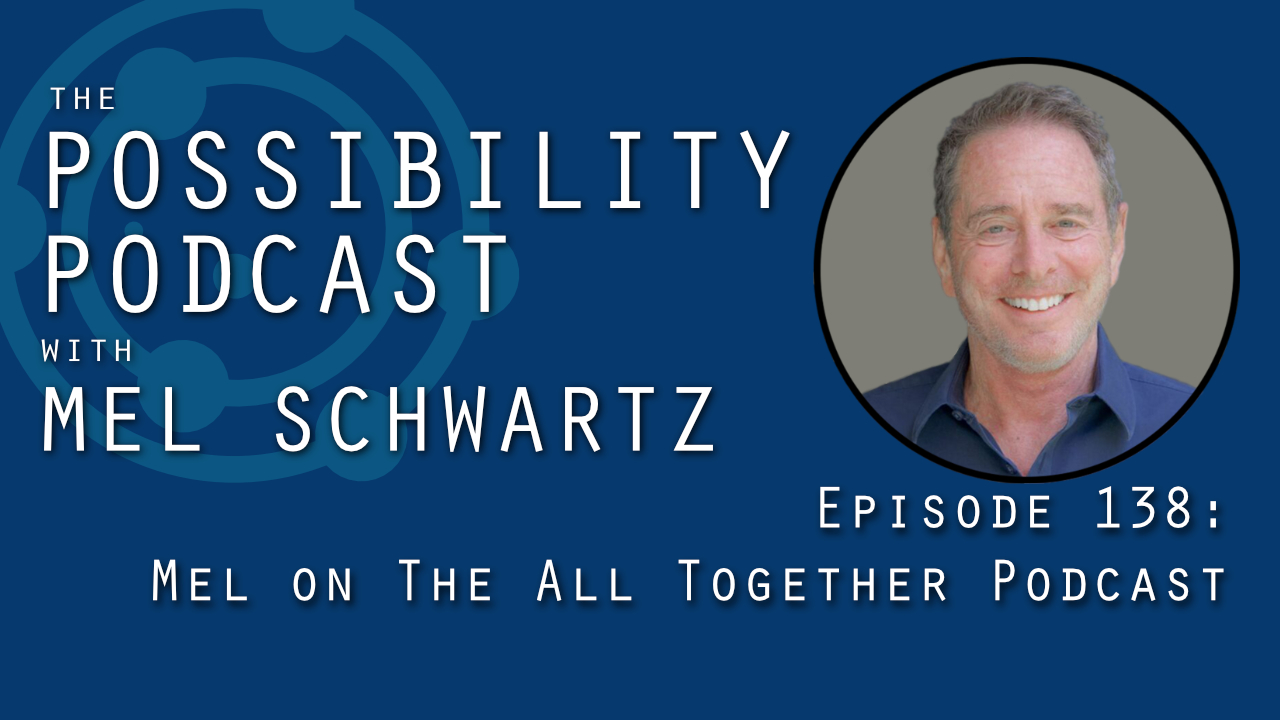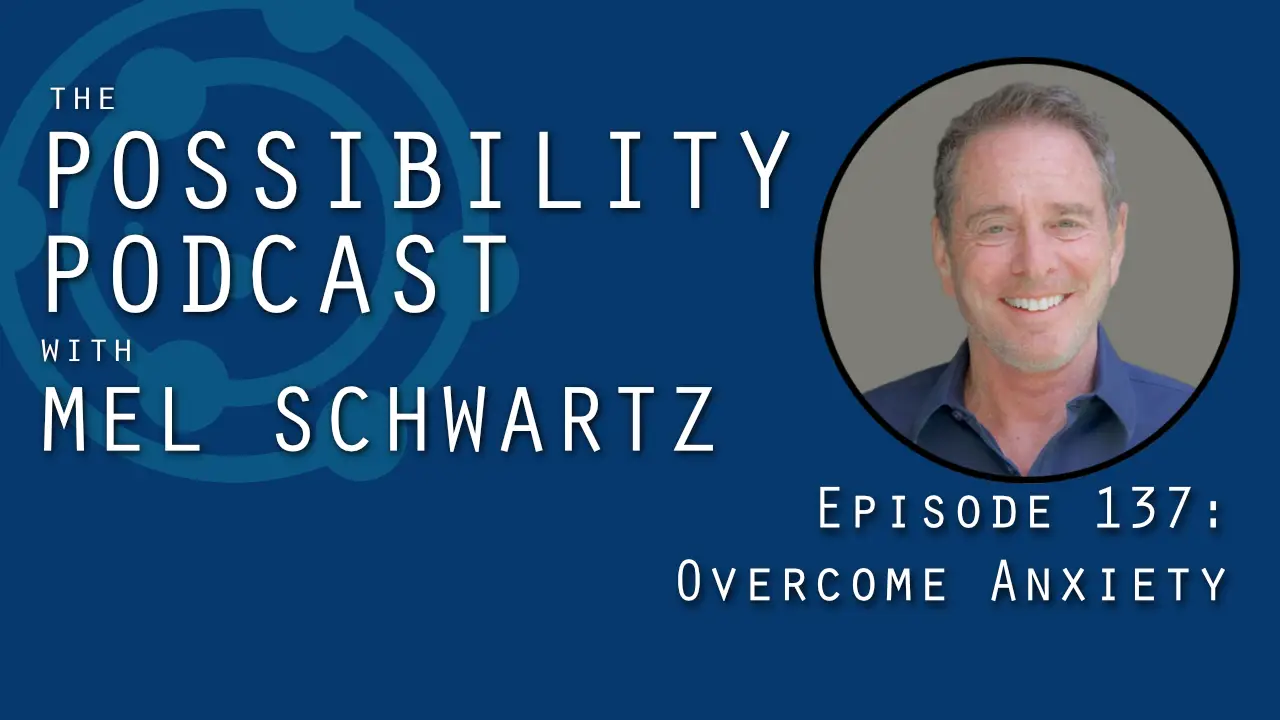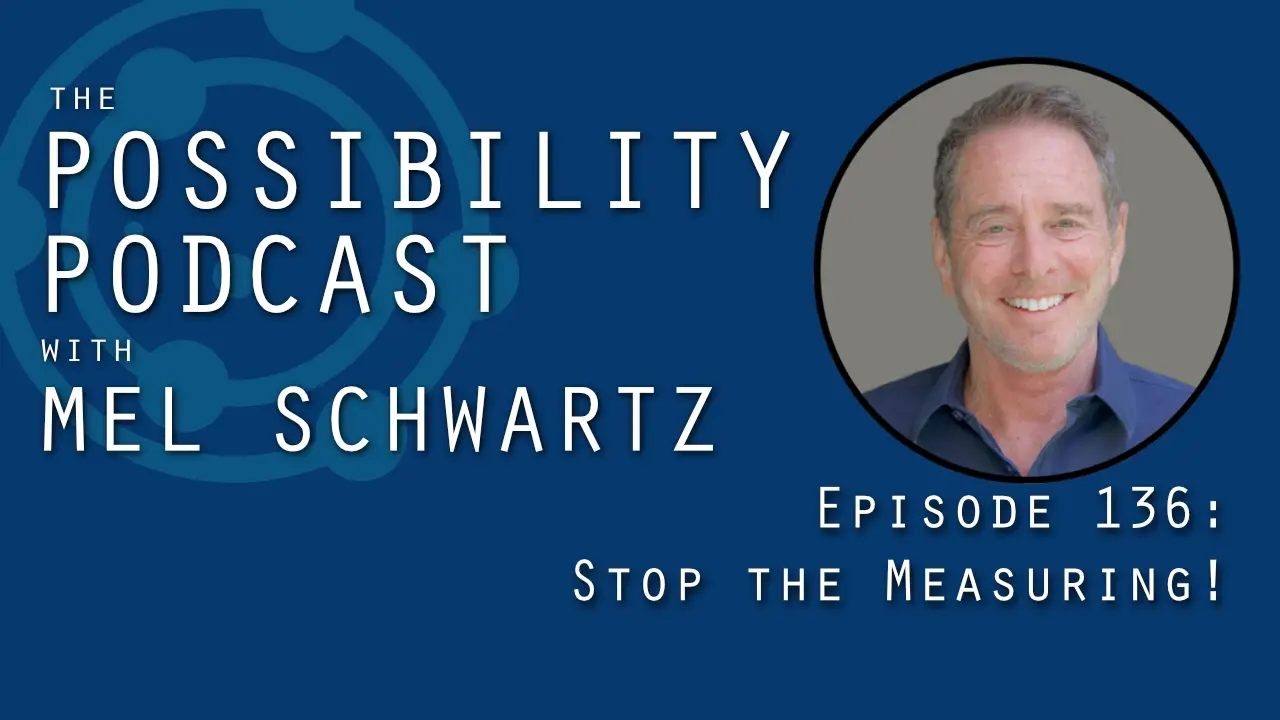Podcast: Play in new window | Download
The Possibility Podcast with Mel Schwartz episode 129 is inspired by a book I’m reading around the time I recorded this, Determined by Robert Sapolsky. What is free will? Has Sapolsky proven it doesn’t exist? What are the implications?
Listen as I argue that free will can be considered from an approach other than the purely scientific, and how that holistic perspective is central to my own commitment to help you escape the influences of your past experience in order to embrace possibility and live a rich and fulfilling life.
Interested in bespoke marriage and relationship counseling from Mel Schwartz? Reach out!
I’d love to hear what you think! Be sure to leave a comment with your own thoughts and questions!
Subscribe to The Possibility Podcast with Mel Schwartz
Don’t miss a single Possibility Podcast with Mel Schwartz! Subscribe for free in iTunes / Apple Podcasts, YouTube, Spotify, RadioPublic, or wherever you listen to podcasts. Or, simply copy / paste the RSS link directly into the podcast app of your choice!
Please Rate and Review
If you enjoy The Possibility Podcast with Mel Schwartz, please take a moment to rate and review the show in iTunes / Apple Podcasts or Podchaser. It only takes a few minutes, and adding your review is as easy as clicking this link.
Your rating and review helps raise the visibility of The Possibility Podcast with Mel Schwartz, especially on iTunes / Apple Podcasts, which is one of the biggest podcasting platforms today. More visibility for the show means more listeners… and that growth means the show reaches — and helps — more people like you.
Thank you!
Talk With Mel!
Help others when Mel helps you: Contact Mel and find out how you can be a guest on the show and ask Mel a question. He’ll put the Possibility Principle to work for you, and your conversation will be recorded for use in a future episode of the podcast so other listeners can benefit. Of course, your anonymity will be respected if that’s your wish.
Transcript of The Possibility Podcast with Mel Schwartz #129
Hello everybody and welcome to The Possibility Podcast. I’m your host Mel Schwartz. I practice psychotherapy, marriage counseling, and I am the author of the book The Possibility Principle, the companion to this podcast. I hope to be your thought provocateur and I’ll be introducing you to new ways of thinking and a new game plan for life.
Today we’re going to dive into one aspect of the nature of possibility. Possibility on the human level kind of implies that we have free will. If we don’t have free will, then what is possible and what is not possible has nothing to do with us.
I have just been reading a fascinating book on the nature of free will. It is called Determined and the author is Robert Sapolsky. Sapolsky is a professor of biology, neurology, and neurological sciences at Stanford University. Very, very noteworthy intellectual scholar. And virtually everything he’s written has caused a visceral, a deep visceral reaction in me. I cannot dispute his empirical research and science and perhaps his conclusions. And yet on an innately intuitive and visceral level, I want to scream, I want to argue. It’s contrary to my core beliefs.
Sapolsky suggests that we are a product of our lived experience. And by this he means that our DNA, our biology, the society and culture and subculture that we are in, our cultural norms, our lived experiences, all create a scenario by which we may think that we’re consciously making decisions and choices, but they’re all rather programmed into us, not in a simplistic, reductive way, but in what he calls an emergent complexity. The variables are rather infinite, but in their infinite complexity, they form our decision making process and that we make decisions without even knowing that we are making them. It’s actually our neurons firing and making our decisions for us, even if we are unaware that we have already made the decision.
The conclusion from his thesis is astounding. We are at the mercy of our lived experience and our neurons, and therefore there’s no fault, there’s no blame because there’s no free will. In other words, Sapolsky’s proposing that there is no actual intentionality because our will is not free, it is a complex that is decided for us. If there’s no free will, the entire basis of jurisprudence of the legal system falls away because number one, nobody is to blame, nobody can be held at fault if we have no free will. And furthermore, there’s no issue of intentionality. We are simply biologically reactive on the level beneath our conscious attention.
Taking Sapolsky’s thesis even further, there’s no morality. How can we have a moral code absent of free will? If we have no ability to behave or not behave, to act or not act in a certain way, Sapolsky would be arguing that we are imprisoned by everything that has preceded us and we are not agents of free will. So the absence of free will means it’s all in our programming and it’s all predetermined.
Again, not in a reductive way, but what Sapolsky calls emergent complexity. There is such insane amount of complexity going on and our decision is made even before our brain is aware of the decision.
I am only halfway through the book, but my reaction is so strong and the dissonance is tremendous because his arguments sound scientifically valid. I’m certainly in no position to argue them, but every aspect of my intuitive being wants to cry out in objection. After all, I am a proponent, a passionate proponent of consciousness, of sentience, of rising above our biological limitations. And my life and my work is devoted toward helping everyone, myself included, to attaining the greatest capacity for free will that we can. Boy, you can just begin to appreciate how this book has triggered me.
Now, have you ever in your life felt an instinct or an urge to do something that you knew was wrong, morally wrong, legally wrong, ethically wrong, and you chose not to do it? Let’s suppose it’s infidelity or an adolescent excitement of stealing something and not getting caught and perhaps you didn’t do it and you didn’t do it opposed to your instinct to do it because you had a moral consideration, you knew it was wrong. And I guess Sapolsky would argue that if you didn’t do it, that was part of your programming. I appreciate this argument, but I think of it differently.
I think of embracing the dissonance between what we want and what we think is right or what we think will cause pain or harm to another or to our own self. Embracing that dissonance is where creativity and growth lie. That’s the emergent field for me, that dissonance. How about the free will to break past the harms that have been done to you if you have been abused or you grew up in a childhood absent of love or nurturing? Can you break past those harms done toward you by emerging in a healthy, sensible way and living a life full of vitality? Of course you can. I can appreciate what Sapolsky’s argument would be, but my argument is that when we rise above the limitations of our neurons and the functioning of our brain, there is consciousness, there is sentience, a deeper manifestation of creative intelligence. For us, leaving Sapolsky’s argument aside, what does free will mean to us on a more mundane, non-scientific level?
Free will requires the ability, the freedom to break free from our past in some way, to choose differently than we’ve been inclined to choose. That’s where growth emerges. But freedom, having the freedom from not attaching to conformity is a large part of free will. Think about the stress and the imposition of societal and cultural norms of conformity, what we can or can’t say, how we can or can’t dress, how we can or can’t engage one another. We are robotic in our acquiescence to societal conformity. Think about children at play. How have they learned the rules of engagement of a culture? Children have not yet conformed, but in an all too early age, our culture, our parenting teaches children to come into conformity, to act and behave in a certain way, in a programmed way.
Ultimately, free will for me requires freedom from old thought and old felts. So remember, and I have shared this any number of times and wrote about it extensively in my book, The Possibility Principle, old thought imprisons us. Throughout our lives, we continue to replicate hundreds of thousands, arguably millions of times the same recurring old thoughts. And when we have old thoughts, they summon up the old feelings, the old felts that attach to those thoughts. We certainly can’t access free will when we are imprisoned by old thought.
The philosopher Alfred North Whitehead created the term which I had never seen before, I think he created it, that term is concrescence. Concrescence is the stirring of energy before a material thing becomes material. In other words, he’s proposing that energy is stirring in a certain way before it becomes material. I worked with his notion of concrescence to develop the ability to know that it’s the stirring, the energy that ultimately becomes a thought. Now that’s just a nanosecond, but in that nanosecond, feeling that energy preceding the thought allows me to see the thought break free from the thought and just see it and say, ah, that’s an old thought, it’s an old feeling, I’m not going there. In that nanosecond, and to use a quantum physics terminology in that state of superposition where I am poised in a place of infinite possibility, boy is there free will there. It’s a learned skill, but you can learn how to do it.
So the intention here is to be able to become the master, to see my old thoughts and my old feelings and not succumb to them. In that nanosecond between the thoughts and the feelings that I’ve always had, in that nanosecond I exist in the state of pure possibility. Now pure possibility is of course free will.
How do you actualize this intention to break free from the past? The past could be the past moment, the past lifetime, the past decade. I’m sure you know some people and see some people who seem to access change easily. Is that because it’s in their programming as Sapolsky would propose? Or is it they have access to that level of consciousness, they’ve broken free from the constraints of old thought?
Becoming conscious, becoming sentient, sentient is self-awareness, awareness of my thought. Becoming conscious and sentient, breaking free from the grip of old thought allows us to transcend the amalgam, the conglomeration of all our past experiences. Now it doesn’t change our DNA, an argument Sapolsky might make, but remember DNA is not an imprint of a direction you have to take, it is simply a suggestive state, you can shift the direction that antenna is programming you in. In a way what I’m speaking about here is the field of epigenetics, in which shifting our environment, shifting our consciousness allows us to break free of the grip of direct programming of DNA.
So to transcend this complex amalgam of our past experience to access consciousness and sentience requires breaking free of the conglomeration of old thought and old felts and old beliefs, temporarily suspending them. I’m not proposing that you can go through your life without having thought and feeling, but it’s in that moment, in that nanosecond when you can break free from it, that you can choose differently, and choosing differently on every level, to me, looks like free will.
I’d love to hear your thoughts, experiences and comments on this very, very intriguing dilemma. Until next time, wishing you the freest will that your free will can provide for you, as long as you do no harm to yourself and do no harm to others. Looking forward to talking with you again soon.
Bye for now.
I hope you enjoyed this episode of the Possibility Podcast. I welcome your feedback on this and any episode. Please send me an email at mel at melschwartz.com or leave a comment in the show notes for this episode at melschwartz.com. If you like what you’re hearing, please take a moment to rate and review the show at Apple Podcasts, Spotify, or wherever you get your podcasts. Your reviews really help boost the visibility for the show, and it’s a great way for you to show your support. Finally, please make sure to subscribe to the Possibility Podcast wherever you listen to podcasts, and that way you’ll never miss an episode. Thanks again, and please remember to always welcome uncertainty into your life and embrace new possibilities.





I agree with Sapolsky. We really do not have free will based on all the variables that go into human decision making. Yes when we become more conscious, we are start to gain more control of our impulses and thoughts but till then we are driven by forces that we never chose.
Agreed Joy